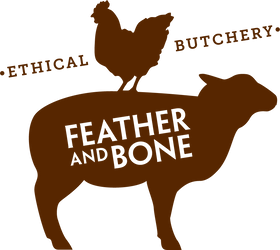The Odd Couple: Feather and Bone & Voiceless
Or Why on Earth a Meat Providore Decided to Join Forces With an Animal Rights Group Full of Vegetarians to Talk About the Cost of Cheap Meat
Our recent inclusion in the Eyelevel project initiated by Australian animal rights group Voiceless has caused some confusion. Not least for the journalist from ABC Radio National’s 'Bush Telegraph' show whose first question, put a bit more diplomatically, was ‘why on earth would a business that makes a living out of selling meat want to encourage people to eat less meat?’ She was very polite but clearly perplexed and rather suspicious. I think she thought that we must either be crazy or have some Machiavellian plan to which Voiceless had fallen victim.
On the face of it, us joining forces with Voiceless might seem a bit peculiar. When they invited us to participate in a project which specifically promotes the idea of eating less meat, we did have to think very carefully about it before agreeing. Not because of the specific project, which we think is a very good one. But because of the risk that people might think, because Feather and Bone agrees with Voiceless on the need to abolish factory farming of animals, that it follows we support their position on everything else.
Just for the record, we believe that, in lieu of legislation, the best way to work toward the abolition of intensive farming of both animals and crops is to promote alternative, sustainably-managed livestock production systems so consumers have a viable, attractive option. We do our best to describe and explain these systems so that people can make informed decisions. We don’t apologise for the fact that we are in the business of killing and eating animals. But we’re proud to be supporting farmers whose priority is the welfare of the soil and animals under their care and whose intention is to leave their land in better shape than they found it. We advocate a balanced diet of sustainably-produced foods with traceable provenance including a range of meats and cuts that take into account the requirement to consume all parts of the animal and waste as little as possible. While we’re energetic advocates of transparency and sustainable farming, we are not affiliated with any specific interest group. We prefer to encourage independent thinking and an informed understanding of all perspectives.
For example, in 2011, when we and the St James Ethics Centre held a panel discussion on the ethics of pork production in Australia, we included representatives from all points of the spectrum. The participants were Senator Lee Rhiannon - Greens spokesperson for animal welfare (the Greens are the only political party
with an animal welfare portfolio), Andrew Spencer - CEO of Australian Pork Limited, Mark Jensen - chef/owner of Red Lantern restaurants, Dana Campbell - Voiceless CEO, Stephen Evans - free range pig farmer, Grant Hilliard - Feather and Bone, and Peter McCormack - Coles’ Meat/Deli/Dairy Pork production/Quality Manager. (Unfortunately, Mr McCormack pulled out the day before so we were denied Coles’ perspective in the discussion.)
Strangely, the one thing about the Voiceless project that didn’t concern us was the possibility of a perceived conflict of interest between our job selling meat and our commitment to animal welfare. This is possibly a telling indicator of our naivety (and maybe we are a bit crazy), but we don’t see any contradiction in our position.
We are equally passionate about promoting the sustainable production and consumption of livestock and the humane treatment and welfare of that livestock. Our interest extends to the welfare of the land which supports livestock and, in fact, all of us. We also believe that any discussion about animal welfare and meat consumption that doesn’t include environmental issues is limited and, ultimately, unproductive.
Take, for example, the charming email we received last week from one frothing individual shrieking at us that animals are sentient beings, that eating meat is murder and that we are, by association, murderers. She is clearly a committed vegetarian who would prefer that all of us follow suit. (This is dangerous territory, we know, but we’ll just dip our toe in momentarily...)
We wondered if this person, glowering down on us from her lofty moral peak, could be completely confident that no animals are harmed in the production of the plant-based food she consumes? For example, wheat grown in Australia.
According to Professor Mike Archer of UNSW, CSIRO data indicates that each area of grain production in eastern Australia is subject on average to a mouse plague every four years. Poisons used to control these plagues kill at least 80% of the mice present which equates, on average, to at least 100 mice per hectare per year in the production of grain. Mice, as it turns out, are very definitely sentient beings and, along with whales, bats and humans, are one of the very few animals that we know of that sing complex songs to each other. (There’s a link to Prof Archer’s article at the end of this piece.)
Then there’s the question of where the additional volumes of plant-based food would come from if we all switched from carnivore to vegetarian? Australia is notoriously dry with not much arable land so what would be required to increase the yield of the lands currently utilised for crop production? How would we feel about the environmental consequences if greater productivity could only be gained with an increase in the use of superphosphates and pesticides? Of, if that’s not acceptable, would we consider clearing native forest to free up more arable land? How would we feel about the loss of native wildlife and habitats?
We’re not partial to extremists of any flavour and we don’t have anything against vegetarians. The point is simply that the modern production of food is a moral and ethical minefield and trying to better understand how our food is grown and make the right individual choices about what to eat and what system to support is not for the faint-hearted. The majority of us have ceded responsibility for food production to a minority of producers and know very little about farming. Lots of us simply choose not to think about it at all. Some of us probably think about it too much. Either way, our purpose is to provide a clear line of sight between the producer and the consumer and to offer consumers an option to the unsustainable intensive food production system.
This is the spirit in which we participated in the Voiceless Eyelevel project and we are grateful to Voiceless for giving us the opportunity. Please watch it yourself and make up your own mind. View the Voiceless Eyelevel video project. Read Professor Mike Archer’s article, The Slaughter of the Singing Sentients.
Then (just to prove that we’re not crazy at all and that we do have a venal, Machiavellian plan) you can support sustainable producers by buying some of our excellent produce...




Leave a comment